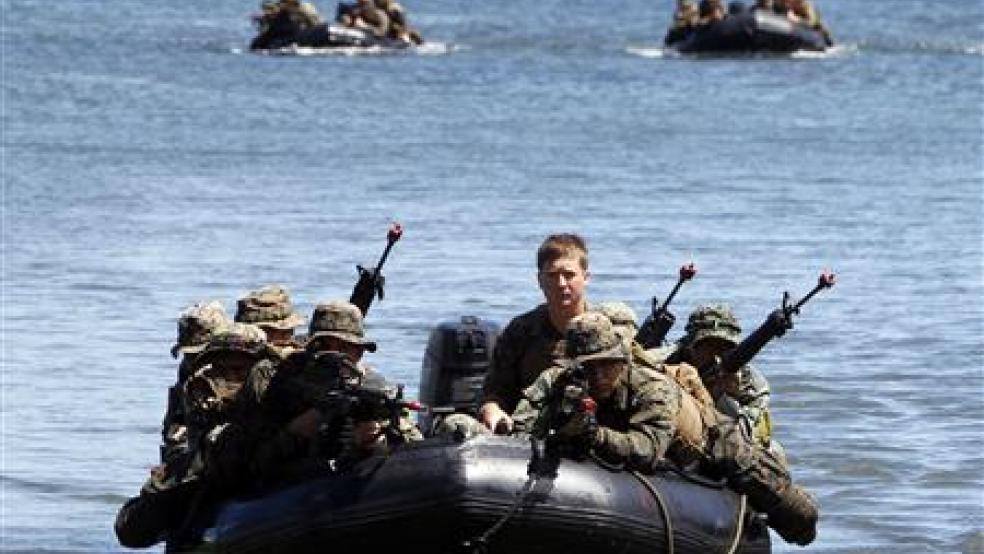ULUGAN BAY, Philippines (Reuters) - U.S. and Philippine commandos waded ashore on Wednesday in a mock assault to retake a small island in energy-rich waters disputed with China, part of a drill involving thousands of troops Beijing had said would raise the risk of armed conflict.
The exercises, part of annual U.S.-Philippine war games on the southwestern island of Palawan, coincide with another standoff between Chinese and Philippine vessels near Scarborough Shoal in a different part of the South China Sea.
China has territorial disputes with the Philippines, Vietnam, Brunei, Malaysia and Taiwan across the South China Sea, each searching for gas and oil while building up their navies and military alliances.
China said last week the drill would raise the risk of confrontation. On Wednesday, Chinese Vice Foreign Minister Cui Tiankai said China was committed to dialogue and diplomacy to resolve the dispute.
"We are certainly worried about the South China Sea issue," Cui told a news briefing in Beijing, saying "some people tried to mix two unrelated things, territorial sovereignty and freedom of navigation".
The comments come before high-level talks with the Obama administration. China, which claims the South China Sea based on historical records, has sought to resolve disputes bilaterally but its neighbors worry over what some see as growing Chinese assertiveness in its claims in the region.
"Location (of the drill) is irrelevant," Ensign Bryan Mitchell, spokesman for the U.S. Marines, told reporters.
"These exercises take place on a regular basis. This year it happens to be in Palawan. The planning for this took place months ago prior to any events that are currently in the headlines."
U.S. President Barack Obama has sought to reassure regional allies that Washington would serve as a counterbalance to China in the South China Sea, part of his campaign to "pivot" U.S. foreign policy towards Asia after wars in Iraq and Afghanistan.
Philippine military officials sought to play down the exercise. Lieutenant General Juancho Sabban, military commander for the western Philippines, said the drill "simply means we want to work together, improve our skills".
Sabban's area of command includes Reed Bank and the Spratlys, a group of 250 mostly uninhabitable islets spread over 427,350 sq km (165,000 sq miles) west of Palawan.
The Spratlys are claimed entirely by China, Taiwan and Vietnam and in part by Malaysia, Brunei and the Philippines.
HUGE OIL, GAS RESERVES
Proven and undiscovered oil reserve estimates in the South China Sea range as high as 213 billion barrels of oil, the U.S. Energy Information Administration said in a 2008 report. That would surpass every country's proven oil reserves except Saudi Arabia and Venezuela, according to the BP Statistical Review.
A Philippine exploration firm, Philex Petroleum Corp, said on Tuesday its unit, Forum Energy Plc, had found more natural gas than expected around Reed Bank, where Chinese navy vessels tried to ram one of Forum Energy's survey ships last year.
The Philippines is due to open oil-and-gas exploration bids in Reed Bank on Friday.
Vietnam reasserted its claim to the Spratlys and the Paracel islands, known in Chinese as the Xisha islands, further west of Scarborough Shoal in what it calls the East Sea.
Self-ruled Taiwan, which China considers a renegade province, reiterated its claims over territories in the South China Sea and urged "countries concerned to exercise self-restraint so that peaceful resolutions can be reached through consultation".
Nearly 7,000 American and Philippine troops are taking part in the two-week drills that are taking place at sea and in different parts of the main Luzon island.
On Wednesday, about 100 commandos came ashore from U.S. and Philippine ships in a simulated amphibious assault at Palawan province to recapture an island supposedly taken by militants, officials said. Earlier estimates had put their number in the hundreds.
Jumping from rubber boats as they hit the shore, the commandos engaged in a mock firefight, making their way inch by inch from the beach to a navy facility to rescue "hostages" and recapture the base.
Four days ago, commando teams rappelled from U.S. helicopters and landed from rubber boats in a mock assault to retake an oil rig in the northern part of Palawan, 18 km (11 miles) off the town of El Nido on the South China Sea.
The annual war games come under the 1951 Mutual Defense Treaty, part of a web of security alliances the United States built in the Asia-Pacific region during the Cold War.
The drills are a rehearsal of a mutual defense plan by the two allies to repel any aggression in the Philippines.
Hundreds of kilometers to the north, a Philippine coast guard ship patrols near Scarborough Shoal, a group of half-submerged rock formations 124 nautical miles west of the main Luzon island, where Chinese fishermen were accosted by Philippine officials three weeks ago, sparking the latest conflict between the two countries.
Manila officials say Chinese response on the Scarborough shoal issue was "based on inaccurate appreciation of the fact and dynamics of the negotiations."
(Additional reporting by Ben Blanchard in BEIJING, John Ruwitch in HANOI and Jonathan Standing in TAIPEI; Editing by Nick Macfie)


